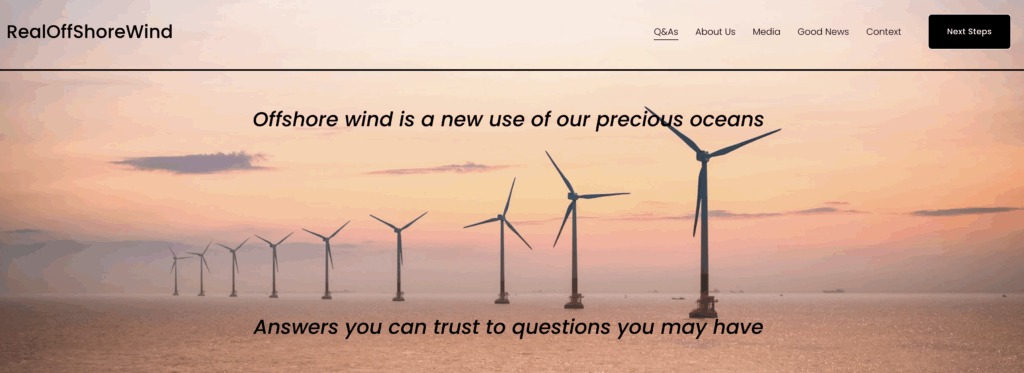Increasingly the sustainability challenges we face require collaborations and efforts that transcend traditional scholarship. We have a number of projects and collaborations that fit this category, some of which are described below.
Radio and Podcasting

Possibly is a short format radioshow/podcast that tackles practical questions about sustainability science. Possibly was conceived by Stephen Porder, Megan Hall (a longtime NPR reporter and freelance journalist) and author/reporter Nancy Pick. Megan serves as the host and Producer, Nat Hardy as our Managing Producer, and Stephen serves as the executive producer. Brown University students make up the reporting team, many of whom have taken Megan’s class “Podcasting for the common good”.

Real Offshore Wind
Rhode Island has some of the best offshore wind resources in the country, and a legal obligation to provide 100% of our electricity with zero-emissions sources by 2033. After pioneering the first offshore wind in the United States, five turbines off block island, it was a no brainer (or so I thought) that Rhode Island would continue to lead in the energy transition. Indeed, the state signed a long term agreement for 400MW of offshore wind (enough to power 300,000 homes before they switch to heat pumps and EVs) with clean, reliable, winter peaking power. The latter is important, because as we electrify home heating (with heat pumps), which saves money and reduces emissions, our electricity demand will begin to spike in the winter (when offshore wind is at its best) rather than the summer (when solar panels are at their best). Indeed, with a combination of about 300 offshore turbines, about 10,000 acres of solar panels, connnection to hydro in Quebec, and some grid storage batteries, Rhode Island could have 24/7/365 renewable emissions free power!
Unfortunately, a combination of power NIMBYish (not in my back yard), political headwinds from a federal administration determined to end all offshore wind, and financial setbacks have left many wondering if offshore wind really holds the promise it was purported to. In order to help answer the questions many people have, and to push back against the relentless stream of half truths, quarter truths and flat out lies coming from advocacy groups against offshore wind, some colleagues and I created realoffshorewind.org. It has answers to questions you might have about the benefits and costs of offshore wind, and offers science informed discussion of one of the most important issues of our day.
Professional Studies

When I started my career, the idea that corporations or governments would have a “chief sustainability officer” was not a thing. But over the past 20 years, that role has grown. At first these were mostly symbolic jobs, a bit of greenwashing perhaps, and an acknowledgment that “we ought to do something”. But in truth not too much, and certainly not if it was too costly.
Today, the world is a different place. Every large organization has someone in this role, and the roles are more and more important. Brown was the first university in the country to create the position of Associate Provost for Sustainability. Harvard, Duke and others have followed suit.What do these people need to know in order to be effective in their jobs? First, they need a robust understanding of the sustainability challenges we face – Brown has defined five broad categories – Climate Change, Nutrient Pollution, Water, Biodiversity and Human Health. Second, they need to know about potential solutions, how scientifically robust they are, and whether they can scale. Just because changing agricultural practice (might) sequester some carbon in soil does not mean it will be simple to induce hundreds of millions of farmers around the world to adopt those practices. Just because renewable electricity is available from offshore wind does not mean local community opposition and misinformation campaigns can’t cost us crucial time in the transition away from fossil fuels. Finally, they need to know how to work with people. To speak convincingly, to listen, and to work with people who have different viewpoints. This is no small skill set, and until now we haven’t really be training people to fill this critically important role.
Much of my teaching is aimed at future leaders in sustainability, but we also need to train today’s leaders. To that end, I’ve been working with Brown’s School of Professional Studies to give a series of lectures called From Science to Solutions. Follow the links to find talks on The Science of Climate Change, the Path to Zero-Emissions Electricity, and Ending Deforestation. More to come in the coming months.
Other communication
In addition to writing scientific papers, we often write for or speak to general audiences. Here are some examples.
The Phosphorus Conundrum – Facing Future TV
Nitrogen: Essential Element and Critical Problems – Facing Future TV
How I learned to stop worrying and love (or tolerate) carbon offsets – Ecosystem Marketplace
We need a shared vision for fixing the climate problem – Real Clear Energy
Sustainability Simplified – American Scientist
Climate optimism in an anxious classroom – Insider Higher Ed
Relax – EVs really are the best choice for the climate – New York Times
Ocean heat – TIME Magazine
Optimism in climate education – Inside Higher Ed
Plants come to land (adapted from Elemental) – Live Science
EPA mutes science – Providence Journal
World Changers 3.0 – Natural History Magazine
Iowa in the Amazon – New York Times